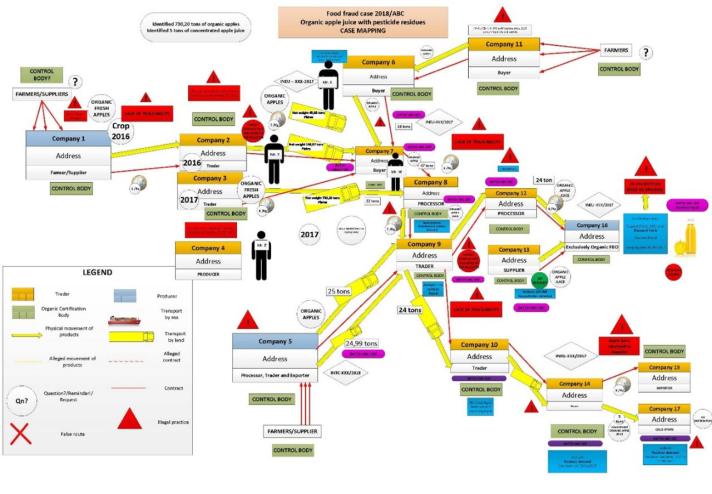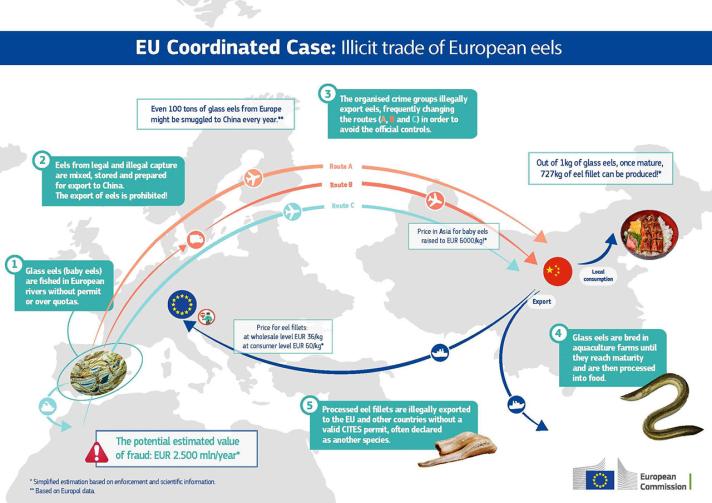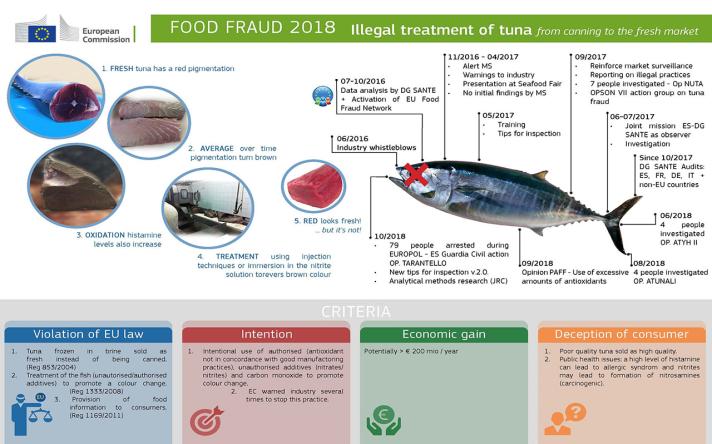In 2019, as part of Operation OPSON VIII, a joint Europol/Interpol initiative targeting trafficking in fake and substandard food and beverages, the Commission led a targeted action on products that do not meet EU standards and that falsely claim to be organic. The aim of this targeted action was to protect consumer trust in the EU organic logo and to combat fraudsters and organised crime that are increasingly engaged on illegal activities in the food sector, while strengthening cooperation by adopting a multi-agency approach (Commission, the network, customs authorities, food experts and police bodies).
During the operational phase, the Commission launched 63 requests to involve the EU Food Fraud Network contact points, covering more than 90,000 tonnes of suspicious organic products. The outcome of the investigations resulted in 12 criminal investigations, 2 Commercial Court cases, 2 financial investigations, 20 administrative procedures and 2 organised crime gangs have been put out of business. Many requests are still under investigation and more results are expected. The Commission, based on data analysis and its own lines of inquiry into the fraud, also prepares the mapping of the complex and important fraudulent schemes to facilitate cooperation between involved countries.

Click to see bigger version
For more information: Presentation – Questions & Answers – Europol press release
Europe is experiencing an increase in illegal fishing and smuggling of glass eels (baby eels) to Asia. Imported European eels are bred in aquaculture establishments, mainly in China, processed into fillets and used to prepare traditional dishes or are sent back to the EU (or other countries) as processed food, but declared as another (non-CITES listed) species. The potential worth of processed food products deriving from one kilo of baby eels equals approximately EUR 25,000.
European eel (Anguilla anguilla) is listed in Appendix II of the Convention on International Trade in Endangered Species of Wild Fauna and Flora (CITES) and cannot be fished or sold without holding a permit. Despite that, criminal networks illegally transport tonnes of eels, putting the survival of the species at risk and classifying this act as a serious environmental crime.
The complex nature of this crime requires close international police cooperation through joint investigations. The Commission launched an EU coordinated case on illegal trade in eels and provided the EU FFN and Europol with key data and analysis to support the joint investigation. In 2019 only, six new food fraud requests concerning the detection of European eel in food products were sent through the system involving 19 Member States.

On 25 April 2018, Europol/Interpol published the results of the OPSON VII operation to which the EU Food Fraud Network contributed in order to detect Tuna intended for canning being fraudulently sold as fresh.
Justice, police, customs and food experts were mobilised to investigate and to ensure the success of this operation in which 11 countries (Spain, Italy, France, Germany, Portugal, The Netherlands, the United Kingdom, Hungary, Liechtenstein, Norway and Switzerland) were involved. In some countries investigations took place on fishing vessels and in processing plants when, in other participating countries, extensive sampling plans took place at distribution and retail levels.
The case is about tuna for canning being illegally treated with substances that enhance the colour leading to a misleading impression of its freshness. This forbidden practice can represent a serious risk to public health, taking into account that the modification of the initial colour can mask spoilage allowing the development of biological amines (histamine) responsible for the so-called scombroid syndrome in humans. Spain and France are also conducting judicial inquiries into tuna destined for canning and sold as fresh and on the illegal use of additives, the results of which cannot be disclosed at this moment. In total, more than 51 tons of tuna have been seized.

For more information:
Presentation - Questions and Answers - Europol press release - Video Illegal treatment of Tuna: from canning grade to sushi grade (EN - FR - DE - ES) - Federal Office of Consumer Protection and Food Safety (Germany) press release - Guardia Civil (Spain) notification.
Presentation - Fipronil in eggs
In January 2016, two Georgian companies exported to the EU ground roasted hazelnuts which were considerably adulterated with peanuts (15% to 22%). It was possible to discover the non-compliance following a consumer's complaint in Germany after an allergic reaction to peanuts. The consumer complained to the industry using the ground hazelnuts as an ingredient. The establishment discovered the listed quantities of undeclared peanuts in batches of ground hazelnuts and hazelnut flour and it reported the suspicion of fraud to the German authorities which launched the alert through the RASFF and the EU Food Fraud Network.
DG SANTE requested Georgia to supply guarantees that the companies concerned (and any other companies involved) were prevented from exporting to the EU as long as those responsible for the fraud were holding their positions. Following DG SANTE's contacts with the Georgian authorities, the country adopted a Regulation on the export of hazelnuts providing for controls on every consignment. A citizen of Georgia has recently been charged with falsification of hazelnut products, facing imprisonment from 2 to 4 years.
The main EU stakeholders were also asked to inform importers/buyers of ground hazelnuts in order to strengthen own checks in their HACCP (Hazard Analysis and Critical Control Points). Strengthened controls were carried out on the EU hazelnut flour markets and similar types of contamination were also being detected (e.g. contamination in hazelnut cream). Thanks to these increased controls, no new such frauds have been detected since then.
Finally, this case triggered the Europol interventions in Germany relating to hazelnuts in the framework of OPSON VI, which focused on undeclared cashew nuts, almonds and peanuts in hazelnuts (see link to Opson VI under related links).
From Hazelnuts to peanuts - collaborating with Georgia: Presentation
Through the screening of recurrent RASFF notifications following Member States’ controls on the market as well as border rejections, DG SANTE came to the conclusion that despite several warnings by the competent authorities, prawn producers in Vietnam continued to use prohibited drugs and levels of antibiotics exceeding the Maximum Residue Levels (MRLs). The Vietnamese authorities were requested for an action plan and informed that any establishment in which the presence of residues of forbidden substances was identified would be withdrawn from the list of Vietnamese processing establishments authorised to export fishery products into the EU.
Vietnamese Agriculture Ministry no longer grants licences for seafood shipments from exporters blocked by the European Union for using banned substances in their products.
Individuals using forbidden chemicals and/or antibiotics or abusing authorised ones, causing excess of permitted limits, will be fined and may suffer a prison sentence up to 20 years.
Use of EU prohibited drugs to treat seafood from Vietnam: Presentation
